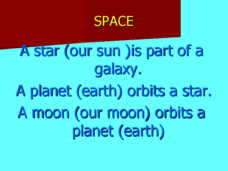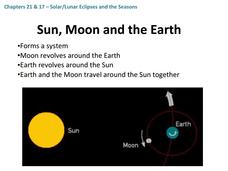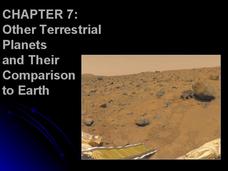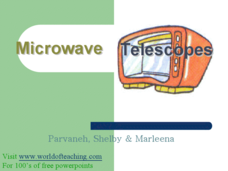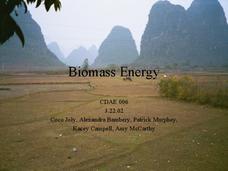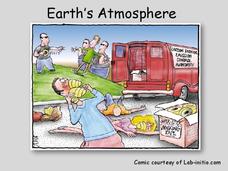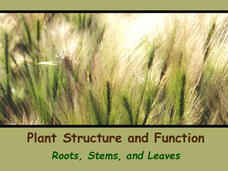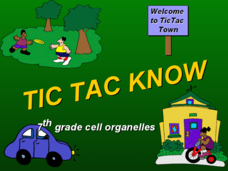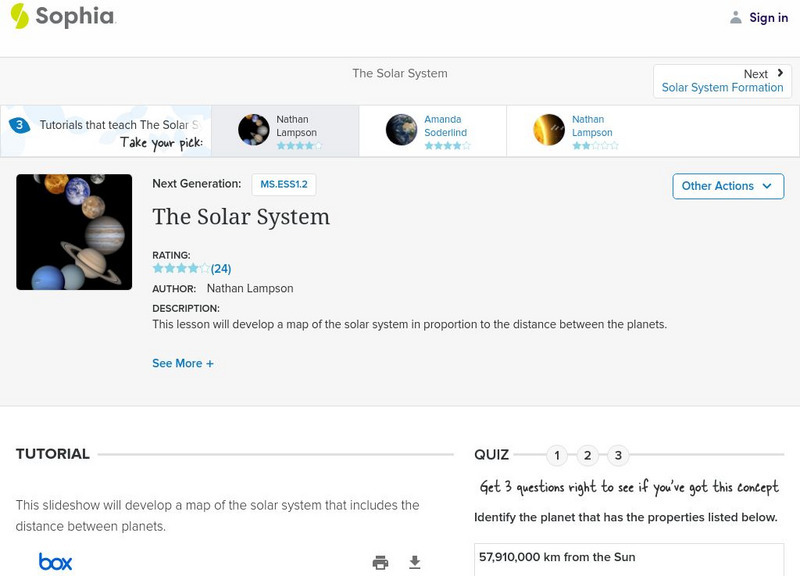Curated OER
Jeopardy 8th Grade (Science)
There are so many topics touched upon in this Jeopardy-style science game, that it is difficult to classify! The categories include electricity, matter, ecology, earth and space, and scientific investigation. This would best be used at...
Curated OER
Jupiter
A student-produced PowerPoint provides basic facts about the planet of Jupiter. Illustrated slides highlight its physical attributes and satellites. A lot of interesting information about Jupiter is included, such as the fact that twenty...
Curated OER
Basic Space
Three basic slides cover information about light years and how images of space are viewed. Some facts about light years are given and then a labeled diagram of a telescope is shown. One basic slide is included with definitions of...
Curated OER
Using Heat
The 6 slides give a few examples of ways that we use heat and heating systems. There is a diagram of circulation in a stove and forced air system as well as other examples of heat movers. Great for an introduction.
Curated OER
Baseball Lesson: The Universe
This PowerPoint provides a look at vocabulary associated with the structure of the solar system. Students review definitions for 8 solar system terms included as well as notes about the universe.
Glynn County School System
The Outer Planets
Are outer planets just like inner planets? Nope! The outer planets are much more spread apart than the inner planets. An informative PowerPoint presentation shows why this is true as well as facts about the individual planets in the...
Curated OER
Solar/Lunar Eclipses and the Seasons
How do the moon, sun, and Earth line up to create eclipses? Why do the seasons change throughout a year? The answers to these questions are explained through this series of slides. This apt presentation outlines information using bullet...
Glynn County School System
Milky Way Galaxy
There is more about the Milky Way that scientists don't know than what they do know—that leaves a lot to discover! A thorough lesson presentation explores the components of the Milky Way Galaxy and their behaviors.
Glynn County School System
Terrestrial Planets
Mercury, Venus, Earth, and Mars are collectively known as the terrestrial planets. Although part of the same group, each planet has its own set of characteristics. Scholars explore the characteristics that make the planets unique and...
Glynn County School System
The Moon
People may not be able to jump over the moon, but scientists can still study it! The moon is covered with mons (mountains) and mars (seas). Aspiring astrologists learn about the moon's features and phases in a PowerPoint presentation. In...
Curated OER
Using Heat
The different types of heating systems are listed here with a few details about each type. The four slides inform your students about the efficiency and efficacy of the heat engines and renewable sources of energy.
Scholastic
Study Jams! The Moon
Take your class to the moon and back with this compact slide show. A mix of computer-generated images and photographs are supported by explanatory text. Observers learn about the moon's movements, its physical features, and its phases....
Curated OER
Day and Night
Inform your elementary scientists why we experience day and night. They are provided with facts and explanation as to why the day and night cycle occur, discuss what they've learned with a partner, and are then given the task of writing...
Curated OER
The Building Blocks
This PowerPoint is a comprehensive review of all the facts related to an atom's basic structure and function. What makes this unique is that it is geared toward an audience of junior geologists. After introducing the periodic table of...
Glynn County School System
Light, History, Gravity, Distance, Relativity, and Space-Time
Let the star's color be the guide! The color of a star indicates its temperature and its mass and distance affect the gravitational force. The lesson presentations address these concepts as well as how the theory of special relativity...
Mr. E. Science
Stars, Galaxies and the Universe
It takes 225 million years for our sun to travel around the galaxy. The presentation covers astronomical units, light years, telescopes, types of stars, the life cycle of a star, and types of galaxies. This is the last lesson in a...
Curated OER
Microwave Telescopes
Discovery of microwaves and other trivia starting this PowerPoint will help interest your class in the application and behavior of these radio waves. Great images to show real-life experiments and equipment help understanding of how the...
Curated OER
Biomass Energy
Consider biomass as an alternative energy source with this PowerPoint. Environmental science pupils discover the potential of converting gases produced by landfills into useful energy. They compare and contrast environmental and economic...
Science Geek
Earth's Atmosphere
Ozone gas absorbs the harmful UV-B rays and helps protect humans. An informative presentation begins with the layers of the earth's atmosphere, the pressure and temperature in each of the layers, the ozone layer, the ozone cycle, and the...
Biology Junction
Plant Structure and Function: Roots, Stems, and Leaves
Scientists found fossils of plants more than 420 million years old—but plants existed for up to 100 million years prior to these fossils. Learn about the importance of plants to the entire planet. Viewing a presentation helps scholars...
Curated OER
Tic Tac Know: organelles
Tic-Tac-Toe is a game most students will be familiar with. This fun activity prompts students to answer questions about cells organelles in order to place a mark on the grid. There are some non-essential humorous sound effects and...
PBS
Pbs Learning Media: Scaled Images of the Solar System
Use the following lithographs to envision the scale of our solar system. View different models of planets at different scales, an infographic about the relative sizes of the planets and distance from the sun, and images of the largest...
PBS
Pbs Learning Media: The Planets of the Solar System
As technology has advanced, so do our views and understanding of the solar system. No longer do we have to rely on our unaided eyes to observe planets. View these high-quality images of planets provided by NASA spacecraft.
Sophia Learning
Sophia: The Solar System: Lesson 1
This lesson will develop a map of the solar system in proportion to the distance between the planets. It is 1 of 3 in the series titled "The Solar System."




